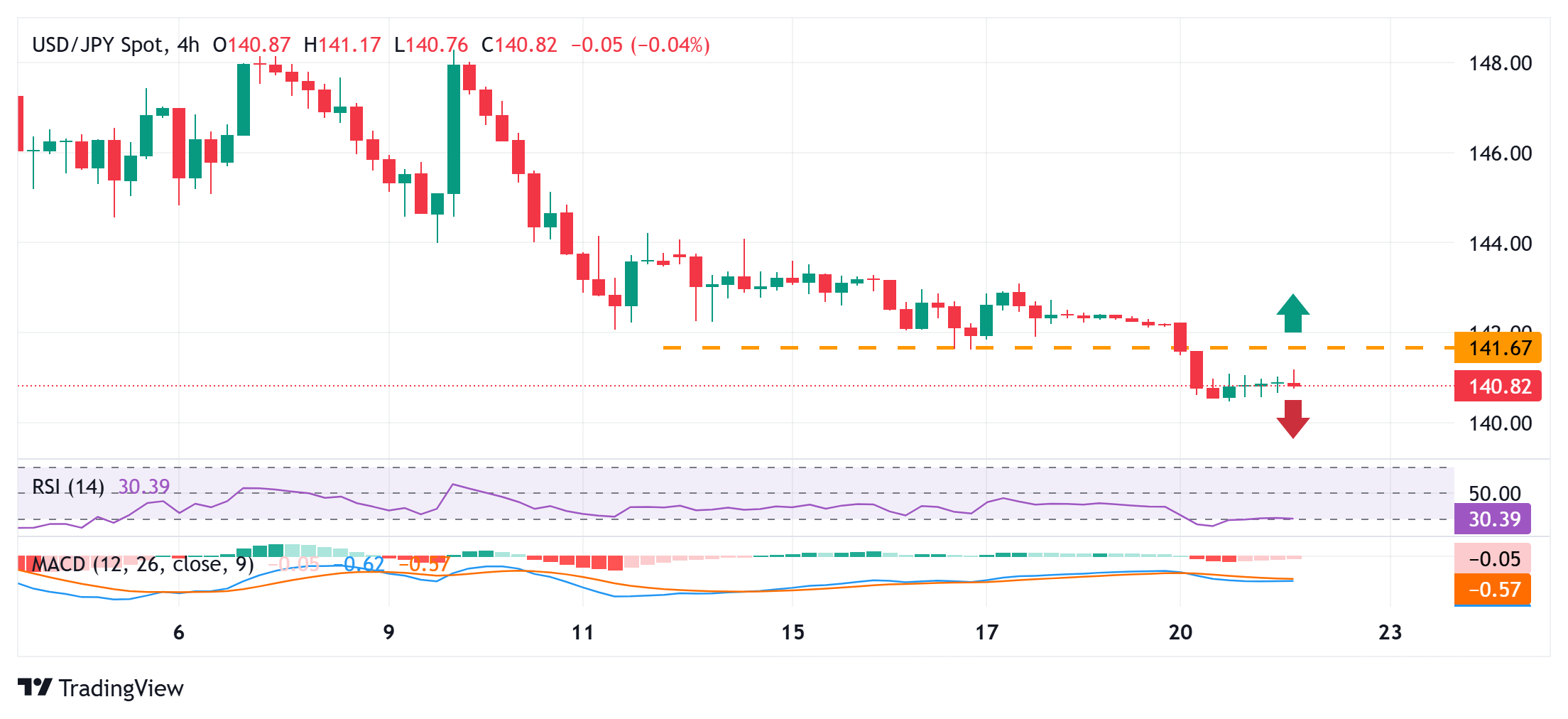Created
: 2025.04.22














![]() 2025.04.22 11:12
2025.04.22 11:12
The Japanese Yen (JPY) edges lower during the Asian session on Tuesday amid receding hopes for a quick US-Japan trade deal. Furthermore, signs of stability in the Asian equity markets and a modest bounce in the US indices futures undermine the safe-haven JPY. This, along with a modest US Dollar (USD) rebound from a three-year low touched on Monday, lifts the USD/JPY pair back above the 141.00 round-figure mark.
Meanwhile, investors remain worried about the potential economic fallout from US President Donald Trump's aggressive tariff policies. This, along with worries that an all-out trade war would trigger a global recession, might keep a lid on any optimism in the markets and act as a tailwind for the JPY. Moreover, bets that the Bank of Japan (BoJ) will raise interest rates further in 2025 should contribute to limiting deeper JPY losses.

From a technical perspective, the slightly oversold daily Relative Strength Index (RSI) is holding back traders from placing fresh bearish bets around the USD/JPY pair. Any subsequent move up, however, is likely to confront stiff resistance near the 141.65-141.60 horizontal support breakpoint. That said, a sustained strength above could trigger a short-covering rally and lift spot prices beyond the 142.00 round figure, toward the next relevant hurdle near the 142.35-142.40 region.
On the flip side, the 140.45 area, or the multi-month low touched on Monday, now seems to protect the immediate downside, below which the USD/JPY pair could accelerate the fall toward the 140.00 psychological mark. The downward trajectory could extend further towards challenging the 2024 yearly swing low, around the 139.60-139.55 region.
The Japanese Yen (JPY) is one of the world's most traded currencies. Its value is broadly determined by the performance of the Japanese economy, but more specifically by the Bank of Japan's policy, the differential between Japanese and US bond yields, or risk sentiment among traders, among other factors.
One of the Bank of Japan's mandates is currency control, so its moves are key for the Yen. The BoJ has directly intervened in currency markets sometimes, generally to lower the value of the Yen, although it refrains from doing it often due to political concerns of its main trading partners. The BoJ ultra-loose monetary policy between 2013 and 2024 caused the Yen to depreciate against its main currency peers due to an increasing policy divergence between the Bank of Japan and other main central banks. More recently, the gradually unwinding of this ultra-loose policy has given some support to the Yen.
Over the last decade, the BoJ's stance of sticking to ultra-loose monetary policy has led to a widening policy divergence with other central banks, particularly with the US Federal Reserve. This supported a widening of the differential between the 10-year US and Japanese bonds, which favored the US Dollar against the Japanese Yen. The BoJ decision in 2024 to gradually abandon the ultra-loose policy, coupled with interest-rate cuts in other major central banks, is narrowing this differential.
The Japanese Yen is often seen as a safe-haven investment. This means that in times of market stress, investors are more likely to put their money in the Japanese currency due to its supposed reliability and stability. Turbulent times are likely to strengthen the Yen's value against other currencies seen as more risky to invest in.
![]()
Created
: 2025.04.22
![]()
Last updated
: 2025.04.22

FXStreet is a forex information website, delivering market analysis and news articles 24/7.
It features a number of articles contributed by well-known analysts, in addition to the ones by its editorial team.
Founded in 2000 by Francesc Riverola, a Spanish economist, it has grown to become a world-renowned information website.
We hope you find this article useful. Any comments or suggestions will be greatly appreciated.
We are also looking for writers with extensive experience in forex and crypto to join us.
please contact us at [email protected].
Disclaimer:
All information and content provided on this website is provided for informational purposes only and is not intended to solicit any investment. Although all efforts are made in order to ensure that the information is correct, no guarantee is provided for the accuracy of any content on this website. Any decision made shall be the responsibility of the investor and Myforex does not take any responsibility whatsoever regarding the use of any information provided herein.
The content provided on this website belongs to Myforex and, where stated, the relevant licensors. All rights are reserved by Myforex and the relevant licensors, and no content of this website, whether in full or in part, shall be copied or displayed elsewhere without the explicit written permission of the relevant copyright holder. If you wish to use any part of the content provided on this website, please ensure that you contact Myforex.
Myforex uses cookies to improve the convenience and functionality of this website. This website may include cookies not only by us but also by third parties (advertisers, log analysts, etc.) for the purpose of tracking the activities of users. Cookie policy